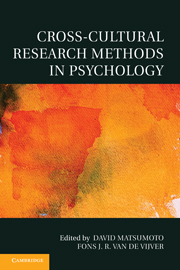Book contents
- Frontmatter
- Contents
- Contributors
- Cross-Cultural Research Methods in Psychology
- 1 Introduction to the Methodological Issues Associated With Cross-Cultural Research
- PART I Conceptual Issues and Design
- Part II Data Analysis and Interpretation
- 7 Methods for Investigating Structural Equivalence
- 8 Evaluating Test and Survey Items for Bias Across Languages and Cultures
- Appendix Statistical Software for Differential Item Functioning Analysis
- 9 Effect Sizes in Cross-Cultural Research
- 10 Data Analytic Approaches for Investigating Isomorphism Between the Individual-Level and the Cultural-Level Internal Structure
- 11 Multilevel Modeling and Cross-Cultural Research
- Appendix Sample Data Sets
- 12 Cross-Cultural Meta-Analysis
- Name index
- Subject index
- References
10 - Data Analytic Approaches for Investigating Isomorphism Between the Individual-Level and the Cultural-Level Internal Structure
Published online by Cambridge University Press: 05 June 2012
- Frontmatter
- Contents
- Contributors
- Cross-Cultural Research Methods in Psychology
- 1 Introduction to the Methodological Issues Associated With Cross-Cultural Research
- PART I Conceptual Issues and Design
- Part II Data Analysis and Interpretation
- 7 Methods for Investigating Structural Equivalence
- 8 Evaluating Test and Survey Items for Bias Across Languages and Cultures
- Appendix Statistical Software for Differential Item Functioning Analysis
- 9 Effect Sizes in Cross-Cultural Research
- 10 Data Analytic Approaches for Investigating Isomorphism Between the Individual-Level and the Cultural-Level Internal Structure
- 11 Multilevel Modeling and Cross-Cultural Research
- Appendix Sample Data Sets
- 12 Cross-Cultural Meta-Analysis
- Name index
- Subject index
- References
Summary
It is standard practice in cross-cultural psychological research to apply a psychological instrument in different cultural groups and quantitatively compare them on the scale(s) of that instrument. Such cross-cultural comparisons can be misleading for three reasons: because of the cultural specificity of the construct, the distorting effects of methodological biases, and the lack of generalizability of individual-level constructs to the cultural level.
According to cultural relativists, psychological characteristics and processes are constructed by and derive their meaning from the cultural system in which they emerge (e.g., Miller, 1997). This implies that it is meaningless to compare cultural groups quantitatively, because it would amount to comparing apples and oranges. For instance, it has been claimed that amae is not only an untranslatable Japanese emotion term but also refers to a typical Japanese emotion process (e.g., Doi, 1971). Because the process is intimately tied to the Japanese culture, it makes no sense to compare cultural groups with respect to their salience of amae.
- Type
- Chapter
- Information
- Cross-Cultural Research Methods in Psychology , pp. 273 - 298Publisher: Cambridge University PressPrint publication year: 2010
References
- 7
- Cited by

